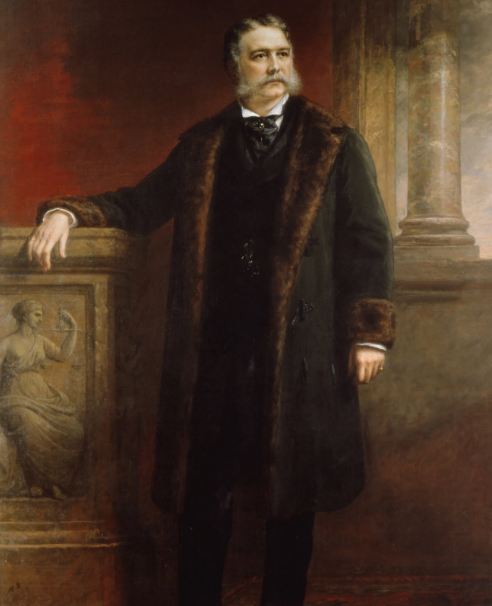In terms of both positive developments and damaging controversies, Chester Arthur’s presidency itself was unremarkable. It is difficult to avoid the list of worst presidents as one of only a handful of American leaders who were never technically elected to serve in the White House.
Before his time in the nation’s capital, Chester Arthur rose to prominence in a corrupt political scene in New York, although his administration is not remembered for any big scandals.
Chester Arthur heard on July 2, 1881, that James Garfield had been seriously injured in a shooting. The gunman, Charles J. Guiteau, was a deranged office-seeker who thought he would be promoted to Garfield’s successor’s patronage position. While Guiteau was scarcely known to him, Chester Arthur had to ease suspicions that he worked behind the assassination.
James Garfield died on September 19, and at 2:15 a.m., New York Supreme Court Justice John R. Brady administered the oath of office to Chester Arthur in the latter’s New York City home on September 20. Before leaving New York, by planning and sending to the White House a proclamation calling for a special Senate session, Arthur secured the presidential line of succession, he ensured that the Senate will appoint a pro tempore president, who would be first in the presidential line of succession.
Chester Arthur soon came into conflict with James Garfield’s cabinet, most of whom were represented by the opposing factions. He distanced himself from Roscoe Conkling at the same time and tried to select officials that both reformers and party loyalists regarded well.
Pendleton Act
In the early 1880s, by placing them in government civil service positions, American politics worked on the spoils system, a political patronage practice in which winning candidates rewarded their loyal supporters, families, and friends.
In the aftermath of corruption during Ulysses Grant’s Administration, campaigns calling for Civil Service Reform emerged. In 1880, Ohio Democratic Senator George H. Pendleton introduced legislation to mandate civil servants’ merit-based selection as decided by an exam.
Chester Arthur signed the Pendleton Civil Service Act on January 16, 1883, a landmark law mandating the allocation of some federal government jobs based on merit rather than political ties.
The act also prevented workers from being dismissed for political purposes and prohibited staff from making compulsory political contributions. Also, the Pendleton Act required a bipartisan Civil Service Commission to be formed to enforce the legislation. The bill formed a civil service commission to supervise civil service reviews and prohibited using “assessments,” fees that political appointees were required to pay as the price for their appointments to their respective political parties.
The Tariff
Chester Arthur attempted, with limited success, to reduce tariffs in addition to civil service reform. The federal government had raised more than it expended since 1866 with high revenue leftover from wartime taxes; the surplus reached $145 million by 1882. Opinions differed about how to minimize the budget surplus; by decreasing tariffs, the Democrats supported reducing the surplus, which would reduce the cost of manufactured products in turn.
Republicans thought that high tariffs guaranteed high production and mining wages and preferred to minimize the surplus by spending more on internal improvements and reducing excise taxes. The tariff debate was complicated because each interest preferred higher tariffs for its specific field; for instance, many Southerners preferred low taxes in general but favored higher tariffs for cotton, a prominent Southern crop.
In 1882, Arthur agreed with his party and called for the abolition of excise taxes on all but liquor and simplifying the complicated system of tariffs.
Foreign Affairs
He vetoed the 1882 Chinese Exclusion Act, which halted Chinese immigration for ten years, but Congress overruled his veto. Congress tried to pass a law halting Chinese immigration for twenty years, which Chester Arthur vetoed due to growing anti-Chinese feelings.
While he objected to Chinese immigrants being refused citizenship, Chester Arthur negotiated with Congress, signing into law the Chinese Exclusion Act in 1882. For ten years, the Chinese Immigration Act was initially meant to prohibit immigration. The act was renewed two more times, however, and was not fully repealed until 1943.
Star Route Scandal
In the mid-1800s, mails in the United States were delivered by steamboats and railroads. The remote areas of the new territories in the West and South West were not yet reached by these transport methods. Hence, the federal government gave private carriers lucrative contracts to deliver the post by horse, wagon, or stagecoach.
The administration of Chester Arthur also battled fraud in the U.S. Postal Service as bribery and corruption by Federal postal officials who awarded highly lucrative postal delivery contracts to private contractors implicated in the Star Route Scandal.
During Ulysses Grant’s administration in 1872, Congress began inquiries into the Star Route postal delivery service. During Chester Arthur’s administration, these lasted until the prosecution trials when the fraudsters were charged postal ring of the Star Route was shut down.
Naval Reform
Chester Arthur’s administration promoted the modernization of the United States Navy. American naval strength decreased precipitously in the years following the Civil War, dwindling from nearly 700 warships to just 52, most of which were obsolete.
The nation’s military attention had been on the Indian wars in the West over the fifteen years before Garfield and Arthur’s election; the region was gradually pacified, many in Congress became concerned about the weak state of the Navy.
Chester Arthur strongly supported these efforts, claiming that a stronger navy would enhance the stability of the country and raise U.S. prestige.
US Presidents | ||

